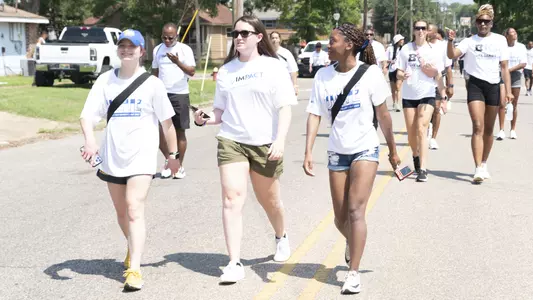
Pitt Contingent Reflects on Unity Tour
7/22/2022 10:03:00 AM | General, Track & Field, Women's Lacrosse
PITTSBURGH – In July, Pitt student-athletes Riley Patrick (women's lacrosse) and Daishon Spann (women's track and field), along with Associate Athletic Director of Culture, Diversity and Engagement Fumi Kimura joined student-athletes and administrators from the ACC, Big 10 and Pac 12 in Montgomery, Ala., to engage in an immersive education experience and visit key sites of the civil rights movement.
"The Unity Tour was an incredible experience," said Kimura "At times it was painful and traumatic and at other times it was inspiring and empowering. Most of all, the shared experience provided the invaluable opportunity to connect on a deeper level with student-athletes and administrators, resulting in a building of community. Meeting colleagues in person for the first time and coming away as friends united in the fight against social injustice is powerful. Big Ten Commissioner Kevin Warren said this experience would change us and he was right."
The participants visited Selma, Alabama and marched from the First Baptist Church across the Edmund Pettus Bridge, the site of "Bloody Sunday". The educational experience included visits to the Alabama Department of Archive & History Museum, the Montgomery Interpretive Center at Alabama State University, the Civil Rights Memorial Center and the Equal Justice Initiative Museum.
"This experience significantly impacted me because I had the chance to learn about this moment in history in a more detailed way than I have ever been taught in school," said Spann. "I learned how much my vote matters and how influential voting during midterm elections are to help elicit change in my direct community. I also learned the power of practicing my freedom of speech and freedom to protest in an effort to educate and inform those that are not up to date with the injustices happening around our nation."
Attendees heard from Ms. Sheyann Webb-Christburg, who is recognized as one of the youngest participants of "Bloody Sunday" and received the Congressional Gold Medal from then-President Barack Obama; Lydia Blackmon Lowery, who was one of 300 people who participated in the five-day, 54-mile march from Selma to Montgomery; and Brian Stevenson, founder and Executive Director of the Equal Justice Initiative, a human rights organization in Montgomery.
"I was immersed in history beyond just facts out of a textbook," said Patrick. "During the trip, we listened to both Sheyann Webb-Christburg and Lynda Blackmon Lowery speak about their firsthand experiences in Selma before, and during the march from Selma to Montgomery. To hear these women, speak of their memories so vividly, adding emotion and individual perspective to the facts, I felt an added dimension to what I had been learning.
Another very unique addition to the learning environment was the bond created between everyone there," added Patrick. "Every person on the tour had a shared passion for equity, diversity and inclusion, leading to immediate connections. As a collective, we walked across the Edmund Pettus Bridge, stood together on the floors of a warehouse where slaves were once held and sat beside each other as we listened to the incredible words of Brian Stevenson, a social justice activist, law professor at New York University School of Law, and the founder and executive director of the Equal Justice Initiative. This intimate feeling with the people around me helped propel the educational experience from purely factual to a completely life-altering event. With this deeper understanding of the Civil Rights Movement and the history leading up to it and into today, I am better equipped to be an effective ally in the fight for racial equality. I will continue to build off this trip for the rest of my life and will share the knowledge I gained. Overall, the ACC Unity Tour was an unforgettable experience unlike anything I have felt before, and I am so glad to have been a part of it."
"The Unity Tour was an incredible experience," said Kimura "At times it was painful and traumatic and at other times it was inspiring and empowering. Most of all, the shared experience provided the invaluable opportunity to connect on a deeper level with student-athletes and administrators, resulting in a building of community. Meeting colleagues in person for the first time and coming away as friends united in the fight against social injustice is powerful. Big Ten Commissioner Kevin Warren said this experience would change us and he was right."
The participants visited Selma, Alabama and marched from the First Baptist Church across the Edmund Pettus Bridge, the site of "Bloody Sunday". The educational experience included visits to the Alabama Department of Archive & History Museum, the Montgomery Interpretive Center at Alabama State University, the Civil Rights Memorial Center and the Equal Justice Initiative Museum.
"This experience significantly impacted me because I had the chance to learn about this moment in history in a more detailed way than I have ever been taught in school," said Spann. "I learned how much my vote matters and how influential voting during midterm elections are to help elicit change in my direct community. I also learned the power of practicing my freedom of speech and freedom to protest in an effort to educate and inform those that are not up to date with the injustices happening around our nation."
Attendees heard from Ms. Sheyann Webb-Christburg, who is recognized as one of the youngest participants of "Bloody Sunday" and received the Congressional Gold Medal from then-President Barack Obama; Lydia Blackmon Lowery, who was one of 300 people who participated in the five-day, 54-mile march from Selma to Montgomery; and Brian Stevenson, founder and Executive Director of the Equal Justice Initiative, a human rights organization in Montgomery.
"I was immersed in history beyond just facts out of a textbook," said Patrick. "During the trip, we listened to both Sheyann Webb-Christburg and Lynda Blackmon Lowery speak about their firsthand experiences in Selma before, and during the march from Selma to Montgomery. To hear these women, speak of their memories so vividly, adding emotion and individual perspective to the facts, I felt an added dimension to what I had been learning.
Another very unique addition to the learning environment was the bond created between everyone there," added Patrick. "Every person on the tour had a shared passion for equity, diversity and inclusion, leading to immediate connections. As a collective, we walked across the Edmund Pettus Bridge, stood together on the floors of a warehouse where slaves were once held and sat beside each other as we listened to the incredible words of Brian Stevenson, a social justice activist, law professor at New York University School of Law, and the founder and executive director of the Equal Justice Initiative. This intimate feeling with the people around me helped propel the educational experience from purely factual to a completely life-altering event. With this deeper understanding of the Civil Rights Movement and the history leading up to it and into today, I am better equipped to be an effective ally in the fight for racial equality. I will continue to build off this trip for the rest of my life and will share the knowledge I gained. Overall, the ACC Unity Tour was an unforgettable experience unlike anything I have felt before, and I am so glad to have been a part of it."
Players Mentioned
Pitt Football | Allen Greene Media Availability | 8.7.25
Thursday, August 07
Allen Greene at Pitt Night at PNC Park
Monday, June 23
Allen Greene Interview with Dan Zangrilli | Pitt Athletics
Saturday, June 21
Allen Greene Interview with Dan Zangrilli
Saturday, June 21

